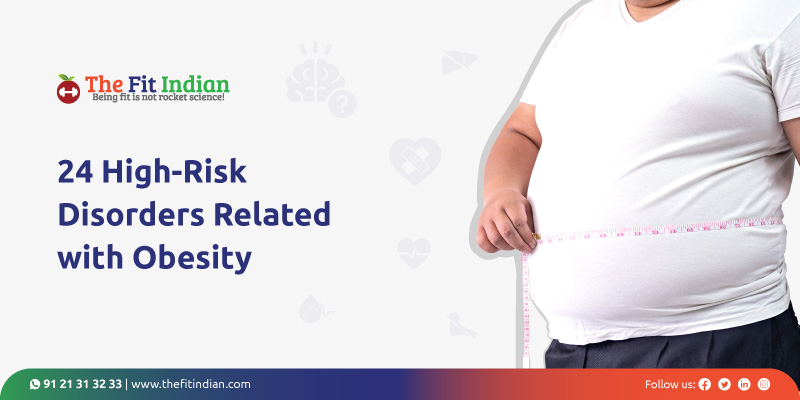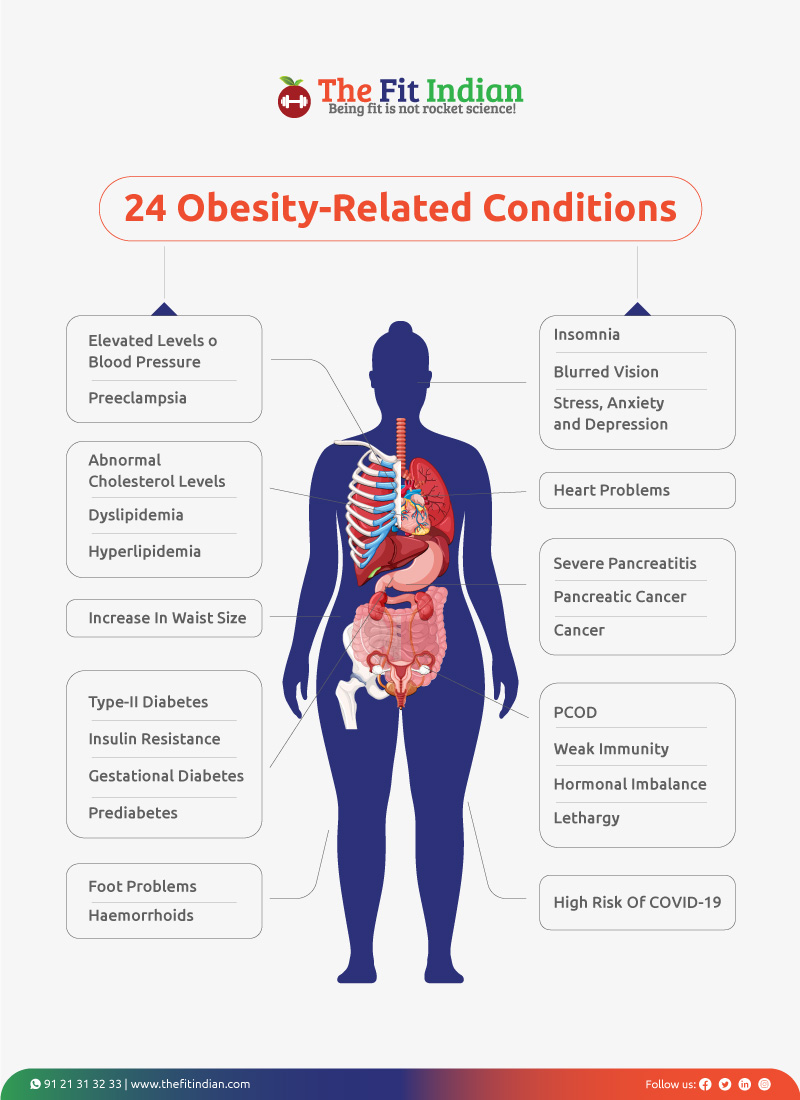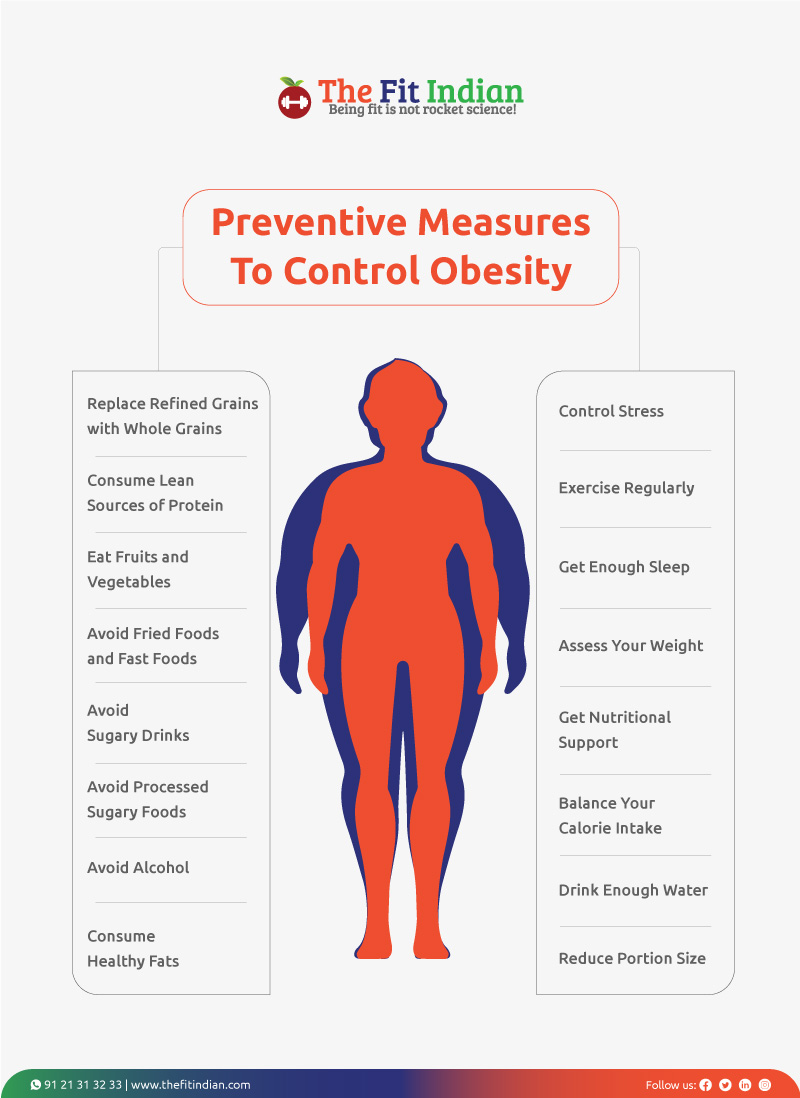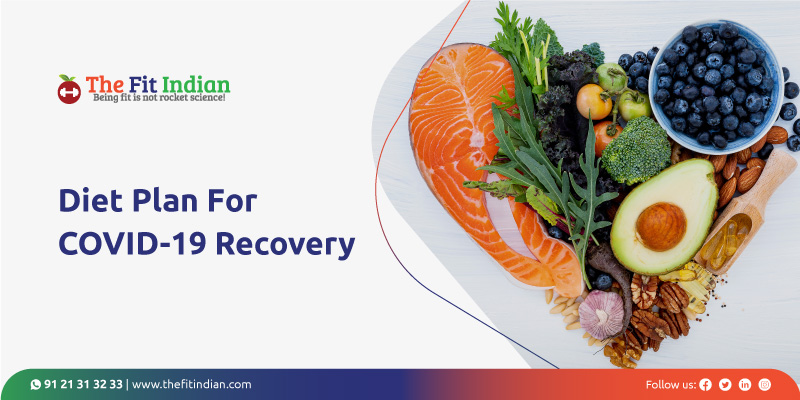24 High-Risk Conditions Associated With Obesity And Preventive Measures
Reviewed by: Dr. T S Deepthi Sarojini | Author: Manoja Kalakanti
Obesity has become a common health condition that has even reached epidemic proportions in several nations. According to the WHO (World Health Organization), the worldwide obesity cases have tripled since 1975. Its report states that 1.9 billion adults were obese in 2016 and 39 million children under the age of 5 were obese in 2020. This indicates the widespread prevalence of childhood obesity. In this article, we’ll talk about 24 high-risk conditions associated with obesity and the ways to prevent them.

There are many health risks of obesity and several risk factors that cause the condition. High blood pressure, high cholesterol levels, diabetes and heart disorders are conditions that could develop due to obesity. Preventing excessive weight gain is the best step to avoid the resultant disorders that develop due to obesity. But first, let’s take a look at the 24 conditions that are related to being overweight.
24 Conditions Associated With Obesity
Obesity is a condition in which an individual has an excess of weight and body fat. A Body Mass Index (BMI) of 30 or more is considered an indicator of obesity. If properly controlled, the health issues related to obesity can be avoided. Over time it could lead to many severe health complications and significantly reduce the quality of life.

There are several conditions that are interlinked with obesity. Many of these are well known, such as the relationship between obesity and coronary heart disease and diabetes. They are either caused by obesity or are responsible for causing one to be obese, resulting in the development of these conditions. Let’s look at the 24 conditions associated with obesity.
1. Type 2 Diabetes
Obesity is considered to be the leading cause of type 2 diabetes, and it is no surprise that most people with diabetes are overweight or obese. Obesity causes inflammation and high fatty acids, which lead to insulin resistance. This can lead to diabetes. You can reduce the risk of diabetes through a healthy lifestyle that involves a well-balanced diet and exercise.
2. Prediabetes
Just like diabetes, prediabetes too can be caused due to inflammation and excessive fat, which increases insulin resistance. The risk of prediabetes exponentially increases if you are obese. A healthy lifestyle can help you keep obesity at bay and thus the consequences.
3. Abnormal Cholesterol Levels
Obesity is one of the biggest risk factors for high cholesterol levels. The low HDL (good) cholesterol levels and the high LDL (bad) cholesterol levels increase the risk of heart diseases and stroke.
4. Foot Problems
There is a direct relation between your body weight and the amount of stress on your feet. Your feet support the body, and excess weight puts immense strain on the joints and bones of the feet. This excess stress will result in many health problems such as osteoarthritis, splayed feet and gout.
5. Elevated levels of blood pressure
Being overweight or obese is among the significant causes of hypertension. It is not a coincidence that many people with obesity also suffer from high blood pressure. Obesity forces your heart to work harder to pump blood through your body. This puts immense stress on the arteries, which reacts with resistance to the blood flow. This resistance causes an increase in your blood pressure.
6. Dyslipidemia
Dyslipidemia is a condition where the blood lipids or the cholesterol and fat levels are abnormally high or low. This condition could lead to heart attacks and stroke. Obesity is directly linked to dyslipidemia, and the best way to avoid it is by lowering your weight through a healthy diet and physical activity.
7. Hyperlipidemia
Hyperlipidemia or high blood cholesterol is a condition in which an individual has high triglycerides and bad cholesterol levels. It increases the risk of heart attacks and strokes. It is often found in people who suffer from obesity.
8. Waist Size Circumference
Your waist size is directly related to your weight. Waist size is also one of the ways to determine if you are obese. Even a person with a healthy weight can be at risk of heart attack, hypertension and diabetes if they carry excess fat around the waist. Men with a waist measurement of 37 inches (94 cm) and women with 31.5 inches (80 cm) are at risk of health problems.
9. Gestational Diabetes
The risk of developing gestational diabetes is significantly higher in women who are obese before pregnancy. This could cause complications during the pregnancy.
10. Insulin Resistance
The risk of insulin resistance and diabetes is significantly higher in people who are obese. In people who are obese, the adipose tissue, which stores lipids and triglycerides, releases insulin-developing factors such as a high amount of hormones, non-esterified fatty acids, and pro-inflammatory cytokines.
11. Hormonal Imbalance
Hormones are directly linked to obesity and are one of the most common causes. An excess amount or a deficiency of hormones can cause obesity. Insulin, growth hormones, leptin, and sex hormones affect our appetite, rate of metabolism, and fat distribution. In obese people, the abnormal levels of hormones impact metabolism and the percentage of body fat.
12. PCOD
Studies have shown an abnormal tolerance to glucose in obese women with Polycystic Ovary Disorder (PCOD).
Women of reproductive age with PCOS are at a higher risk of being obese.
13. Haemorrhoids
Haemorrhoids are common in people who are obese. Excess weight puts immense pressure on the blood vessels around the anus and rectum. Excess abdominal weight increases the risk significantly.
14. Lowers Immunity
Your overall health and lifestyle have an impact on your immune system. An unhealthy lifestyle characterized by a sedentary lifestyle and poor diet can weaken the immune system and make you prone to illnesses. Generally, people who are obese do not eat healthy foods and do not get adequate exercise, two factors that strengthen their immunity. But even eating healthy if you are obese does not make your immune system strong. Inflammation, a decreased production of cytokines, and a decreased response to antigen and mitogen stimulation are factors that weaken the immune system in obese people.
15. Cancer
The link between obesity and cancer has been established. Obesity has been linked to an increased risk of cancers such as kidney, uterine, pancreatic and colorectal cancer. It is believed to be primarily caused by the visceral fat that surrounds the organs. Visceral fat impacts your bodily functions, including hormones. The excess visceral fat can lead to oxygen deprivation, which can cause inflammation. Long-term inflammation can increase the risk of cancer.
16. Insomnia
Sleep deprivation and obesity go hand-in-hand. People who are overweight or obese are more likely to have trouble with adequate sleep. Lack of sleep impacts metabolism and affects leptin and ghrelin, two hormones that regulate appetite. These imbalances can result in hunger pangs, making you overeat; you may also be tempted to consume unhealthy and high-calorie foods. A lack of sleep can also result in weight gain. Furthermore, lack of rest will result in fatigue, which means you’ll be too tired to exercise, thus avoiding it altogether.
17. Stress, Anxiety, Depression
Stress, anxiety and depression are all interconnected. They can also lead to obesity and vice versa. Stress and anxiety can lead to depression, and as a coping mechanism, a person may eat more, which leads to obesity. Bullying, insecurity and the social stigma associated with obesity can also lead to depression.
18. Blurred Vision
The pressure that obesity puts on the blood vessels and heart results in either the bursting of your eyes’ blood vessels or their blocking. This could affect the supply of nourishment provided by the blood vessels to the eyes, leading to poor vision.
19. High risk of COVID-19
The coronavirus pandemic has highlighted the importance of being healthy. People with conditions such as obesity, diabetes, high blood pressure and heart diseases suffered severe complications and even mortality due to COVID-19. Obesity can cause these conditions and increase the risk of complications and death even further. And since obesity weakens the immune system, people who are obese are at a higher risk of being severely ill or dying from the virus.
20. Lethargy
Lethargy is a common symptom of being overweight or obese. Obese people often suffer from sleep apnea, which results in inadequate sleep, causing daytime tiredness. The inflammation and stress related to obesity increase the chances of fatigue.
21. Heart problems
Heart problems are closely associated with obesity. Obesity is one of the leading causes of heart attacks. Obesity is responsible for conditions that affect heart health, such as diabetes and high blood pressure. Both these conditions increase the risk of heart attacks and strokes. Even the slightest weight change can help reduce the risk.
22. Severe Pancreatitis
Severe pancreatitis and other pancreatic diseases are commonly observed in overweight people. Inflammation is the primary cause of this.
23. Pancreatic Cancer
Obesity is considered to be amongst the most common factors leading to various pancreatic diseases such as pancreatitis and pancreatic cancer. According to the American Cancer Society, obese people are 20% more likely to develop pancreatic cancer.
24. Preeclampsia
Preeclampsia is one of the medical conditions associated with obesity. This condition is a complication related to pregnancy, which causes high blood pressure and damage to other organs. Obesity significantly increases the risk of the condition. The higher amount of triglycerides and fatty acids in the body of an obese woman is considered to be the cause.
The above health complications of obesity can be avoided if you can successfully manage your weight. So, let’s look at the ways to prevent obesity.
Ways to Prevent Obesity
The first step in preventing the condition is to understand the causes of obesity. Below are some of the most common causes of obesity. Unhealthy food habits and a sedentary lifestyle play a central role in causing weight gain.
Common causes of obesity:
- A diet high in fats and sugars
- Regular consumption of sweetened drinks
- Following a western diet rich in fats, junk food and processed foods
- A changing lifestyle and change in food habits due to increasing urbanization
- Binge eating
- Psychological factors like stress or anger can lead to overeating
- Lack of physical activity
- Less water intake
- Eating late at nights
- Lack of sleep
- Certain medications
- Certain health conditions
- Genetic determinants/family history
- Environmental factors
- Ethnicity
- Eating disorders
- False information
There are many factors that result in obesity, but diet and lifestyle are regarded to be the foremost. With proper care, you can overcome the condition. Breathing problems, excessive fat, joint pains in the knees or lower back, fatigue and excessive sweating are some of the symptoms of the condition.

Following are some effective methods for the prevention of obesity.
- Replace refined grains such as white bread, white rice and pasta with whole grains such as whole-wheat bread, brown rice and oats
- Consume lean sources of protein, such as chicken, seafood, and beans
- Eat more servings of fruits and vegetables
- Cut out fried foods, fast foods, and sugary snacks
- Avoid sugary drinks, like sodas and juice. Consume less processed sugary foods.
- Avoid alcohol
- Consume less “bad” fat and eat more “good” fat
- Control stress
- Exercise regularly
- Get enough sleep
- Assess your weight
- Get nutritional support
- Balance your calorie intake
- Drink enough water
- Reduce portion size
As you already read, eating low glycemic index foods, a low-fat diet with good dietary fibre, and more vegetables and fruits are some dietary tips to manage obesity. A healthy diet and exercise such as regular aerobic activity lowers blood pressure and helps you avoid the conditions associated with obesity and other long-term effects of obesity. So, set your goals and make a plan to combat the condition to overcome it.
The Link Between Obesity and COVID-19 – Diet Plan Post COVID-19
The one vital aspect of our health that the current COVID-19 pandemic highlighted is the severity of COVID-19 symptoms in patients who are obese. The mortality rate is also higher in people with obesity. Being overweight impairs the proper functioning of the lungs and also the immune system. This makes it difficult for such patients to put up a fight against the coronavirus.

While vaccinations can help reduce the severity of symptoms, it does not prevent people from getting infected. Many people are getting infected even after getting vaccinated. You also need to boost your immune system through a healthy lifestyle and diet. The following diet is suitable for people with obesity who are recovering from a bout of COVID-19.
Covid-19 Recovery diet with high risk of obesity
| Timings | Meal Plan |
| Early Morning | 5 soaked almonds/2-3 whole walnuts/5 raisins along with
1 cup of a herbal concoction made with ginger, tulsi leaves and coriander seeds or Have a clove of raw garlic with water. Benefits: Packed with vitamins, minerals, antioxidants and healthy fats. Soaked almonds- support digestion and aid weight loss to improve heart health. Garlic has also been recognized for its antifungal properties and for its ability to prevent strokes. Calories– Approximately – 50 Kcals |
| Physical Activity | Benefits: Exercise is an important part of recovery after a bout of COVID-19.
Exercise helps to increase muscle strength, reduce breathlessness, and improve fitness, balance, and coordination. Approximate calories burned per hour – Sleeping- 55, gardening -250 standing – 100, walking 3 kmph – 280 +, running – 700+, eating – 85. |
| Breakfast | Egg white omelette with 1 cup corn flakes upma
or 1 cup vegetable poha with 1 glass thick lassi or 1 cup sambar with 3 Idlis Benefits: Rich in fibre to fulfil our satiety and provide fuel for the whole day. Eggs are edible sources of omega-3 fatty acids, and flakes are rich in iron. Calories: Approximately 250 Kcals |
| Mid Morning | 1 glass Amla juice with kiwi or papaya
or 150 ml – Tender coconut water Benefits: Controls diabetes, burns fat, helps you lose those love handles Calories: Approximately less than 50 kcals |
| Lunch | 1 cup jeera rice + 1 cup fish curry + 1 cucumber salad
or 2 medium-size phulka + 1 cup tofu with spinach + 1 cup salad Benefits: Rich in fibre, protein, rich in omega 3 fatty acids and easily digestible. Calories: Approximately 300 Kcals |
| Evening | 1/2 cup Makhana with 1 cup green tea (ginger or cinnamon )
or 1/2 cup bhel with 1 cup almond tea Benefits: For a change of flavour, use ginger, cinnamon with refreshing snacks, rich in antidiabetic and antihyperlipidemic activity, low in cholesterol, saturated fats and sodium. Calories: Less than 100 Kcals |
| Dinner | 1 cup egg rice/1 ajwaini roti/aloo methi (of your choice) + 1 cup of curd.
or Chicken rice + 1 cup vegetable salad Benefits: For taste buds, methi and ajwain should be preferred. Methi – lowers cholesterol, diabetes. Ajwain – Regulates menstruation cycles in women, remedy for weight control. Calories: Approximately 400 Kcals |
| Bedtime | 1 glass milk with turmeric
Benefits: Good sleep, anti-inflammatory agent with calcium support Calories: Approximately 43 Kcals |
| Key guidelines | Increase calories intake – While fighting the virus present inside the body, a lot of energy is used, which makes us feel drained and tired. Adding calorie-dense foods to your diet is necessary at this time to return to normal health. |
| Proteins – Protein is an important nutrient for cell growth and regeneration. It is the building block of life and is required by our body for faster recovery. When suffering from COVID-19, it is recommended to eat a high-protein diet. | |
| Vitamins and Minerals – Aim for 5 portions of fruits and vegetables in a day. Citrus fruits are packed with vitamin C, which helps in the formation of antibodies and fights infection. Green and root vegetables help to strengthen the immune system. Also, spend
some time outdoors to get a sufficient amount of vitamin D. |
|
| Fluids – Water is an essential element for life as it carries nutrients in the blood, regulates body temperature, and flush out toxins from the body. Besides, an infection can dehydrate the body. Try to drink at least 2-3 litres of water every day. You can also consume herbal concoctions, coconut water, milk and fresh juice. Avoid packed juice, caffeine and fizzy drinks. |
Following the above diet improves immunity which is good for recovery in COVID-19 patients. But it is always advised to take all the necessary precautions laid down by health experts. Even post-vaccination, you must ensure that you maintain a safe distance from others, always wear a mask when outdoors, sanitize surfaces before touching them and your hands after, and also avoid touching your face without sanitizing your hands.
Takeaway
Unhealthy weight can cause an array of health problems, both physical and mental. For optimal health, it is crucial to steer clear of obesity and the health risks. The good news is that even the smallest reduction in weight can positively impact your health. Eating healthy and engaging in moderate exercise can go a long way in the successful management of obesity and keeping conditions associated with obesity at bay. For a customized diet and workout plan, you can contact a nutritionist or a fitness expert. Maintaining a healthy weight makes you feel and look good. It can help you reduce stress, improve confidence and live a healthy and long life.
FAQ’s
1. What are the health risks of obesity?
Obesity can cause severe health issues. It can result in heart problems, hypertension, diabetes, stress, anxiety, depression, and several other diseases.
2. Can obese people be healthy?
People who are overweight or obese can be healthy if they are on a healthy diet and exercise regimen to reduce weight. But long-term obesity can result in many health conditions associated with obesity.
3. Does anxiety cause obesity?
Yes. Anxiety and stress can cause obesity. Anxiety can cause an increase in cortisol levels, which can cause fat to build up in the stomach. People with anxiety may also overeat to overcome the emotion.
4. Does obesity cause low self-esteem?
Obesity can cause low self-esteem and lack of confidence in people compared to their thinner counterparts. This could result from the stigma associated with being obese and other social factors such as body shaming.
5. How does obesity affect behaviour?
Being obese could directly impact an individuals behaviour. In children and teens, it could result in a lack of confidence, stress and anxiety due to the stigma surrounding the condition. This could affect their studies and social behaviour.
6. Can you reverse the effects of obesity?
It might seem like a herculean task, but you can overcome obesity with consistent effort and dedication. Consult a doctor, nutritionist or dietician and prepare a healthy meal plan along with an exercise regimen. Follow the advice and the plan to see incredible results.
7. How does obesity affect mental health?
Obesity can cause a lot of stress, anxiety and even depression due to deteriorating health as well as the social stigma surrounding weight.
8. What is the best treatment for obesity?
Health experts around the world unanimously agree upon the best treatment for obesity. It is following a healthy diet along with regular exercise.
9. Who is at higher risk of developing serious illness from COVID-19?
Older people, those with a compromised immune system and people suffering from heart disease, hypertension, diabetes and obesity are more susceptible to developing serious illnesses from COVID-19.
10. Can obesity be cured?
In certain cases, it can be reversed through proper diet and exercise. But if other factors such as genetics or health disorders are involved, it may be challenging to overcome the condition.




Manoja Kalakanti